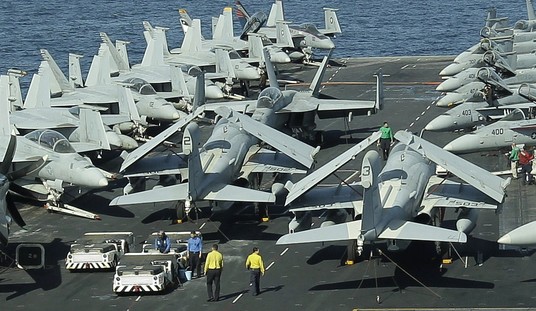In a deepening crisis many things will get steadily worse, but counter-intuitively some things will get unexpectedly better. Historical discontinuities not only marks ends, but also beginnings. The trick to riding the wave is figuring out what things are going up and what things are going down. The list of things going down includes the EU, big government and the societies of the Middle East.
Iraq has been rocked by a wave of bombings that ominously presage increased ethnic tensions. Italian bonds are having to pay out 7% again, Hungary is having to pay 10%, and Eurozone bank shares fell for the second day running. The European news collectively suggests that the Continent’s financial crisis, far from being over, is simply back from the Christmas holidays.
California has seen its planned high-speed rail project triple in price to nearly $100 billion, and the California High-Speed Rail Peer Review Group declared it financially infeasible, thus putting a damper on the proposed bond offering to raise more money for it. The project’s woes haven’t changed the Golden State’s determination to build it. But President Obama has set about trying to reduce the deficit by cutting back on the US military.
U.S. President Barack Obama is expected to unveil on Thursday a new defense plan reflecting billions of dollars in budget cuts and ending a decades-old strategy of being prepared to fight two wars at once …
The strategic review is expected to emphasize a U.S. commitment to the Asia-Pacific region as a result of Washington’s growing concerns over Beijing’s rapidly expanding military. Another prominent part of the review is a strategy to counter Iran.
Panetta will announce plans to cut troop numbers, reduce civilian staff, and delay several new weapons programs, including construction of a new aircraft carrier. He also wants to find ways to cut personnel costs by reviewing military pensions and health care spending for troops and their families.
Some news reports say troop levels could be cut by 10 percent, mostly from the Army and Marines. Reports says this reduction could include soldiers stationed in Europe and some troops focused on counter-insurgency efforts in countries like Afghanistan.
That means there will be very little margin left in case something blows in the Middle East. Bloomberg is reporting that Egypt is nearly out of money and that means trouble in a country that must import a very large portion of its bread.
Egypt’s international reserves (EGIRES) fell for a 12th month in December, extending a slide that may undermine the central bank’s ability to defend the currency.
Reserves declined to $18.1 billion from $20.2 billion in November, according to data posted on the bank’s website today. They stood at $36 billion a year ago, before the start of the revolt that ousted President Hosni Mubarak. Central bank support has helped cushion the impact of political turmoil on Egypt’s currency.
“It’s a bigger drop than the market had expected and underscores the toll that political tensions continue to take on the Egyptian economy,” said Simon Williams, the Dubai-based chief economist for the Middle East and North Africa at HSBC Holdings Plc. The drop will add to expectations that “the Egyptian pound will weaken from here on.” Tourists and investors have shunned Egypt since protests began almost a year ago.
Egypt is in free fall, and there was bad news elsewhere, as the region’s markets collectively dropped by $111 billion. “With the exception of Qatar, the Arab World’s stock markets all ended the year with sharp drops both in share prices and trading volume as unrest took the wind out of much of the regional economy and sent political shivers everywhere.”
The fires are being stoked from yet another direction by Europe’s decision to ban the importation of Iranian oil. “A final decision by the European Union will not come before the end of January and would be carried out in stages to avoid major disruptions in global oil supplies.” But Iran, which needs oil revenues to import goods, may not take it lying down.
The increasingly shrill tone from Iran seemed a direct response, diplomats suggested, to economic sanctions that are finally biting hard and threaten to damage Iran’s ability to export oil. Oil represents about 60 percent of Iran’s economy, and oil exports are a vital source of foreign currency. In 2010, European countries bought about 18 percent of Iranian oil exports, with most of the rest going to Asia. So a European oil embargo would have a limited but significant effect on Iran, which depends heavily on its oil exports for cash to buy needed imports.
But if the crisis in the Middle East is proximate, it involves only second rate powers. The only real first rate power facing America is China. Maybe Panetta is right after all to keep his eye on Asia as the Washington Post reports that China is now focused on merely keeping North Korea from collapsing. “Pyongyang’s precarious power transfer has narrowed China’s goals on the Korean Peninsula, experts here say, turning Beijing from a benefactor and adviser into a protector — concerned foremost with preventing collapse, not pushing for improvement.” It is worried above all about North Korea folding in a southerly direction. “The notion of a democratized Korean Peninsula with U.S. troops positioned directly along the Chinese border — one scenario in a North Korean collapse — is threatening to China.”
While America faces a potential two-front crisis with a one front fire brigade, President Obama is focusing his efforts on getting his chosen man into the strategically crucial position of Consumer Protection watchdog, even if he has to defy Congress to do it. New York Magazine’s Jonathan Chait describes the President’s sure sense of priorities:
So Obama tried the audacious and legally indeterminate move of simply declaring the pro-forma session a sham, insisting Congress really was on recess, and appointing his man. … recognizing that Congress is simply treating every negotiation as a zero-sum contest undertaken with the goal of defeating him, Obama has abandoned any hope of negotiation or legislative progress …
Part of the agenda entails talking up bills he knows Congress won’t pass, like new infrastructure spending. Part involves taking unilateral steps that bypass Congress, like executive orders or recess appointments. Obama’s political advisers believe that this makes him look strong and demonstrates his desire for action.
Yes, that’s the ticket.
So what’s the good news? The best news is that the real people in the real world continue to figure out better ways to produce goods and services. The most dramatic of these developments is the shale gas revolution. It offers the real possibility that the world’s most productive countries will soon dominate energy production or at least become self-sufficient.
But the real news from EIA studies is that shale gas is abundant in territories previously regarded as poor in fossil fuels or dependent on imports: China, the United States and Argentina head the list, but large reserves are also found in South Africa, Australia, Poland, France, Chile, Sweden, Paraguay, Pakistan and India.
“The global energy chessboard is changing, and markets will be realigned. Countries that have never had so much available energy will become self-sufficient, and perhaps even exporters,” Luis Alberto Terrero, head of the Venezuelan Gas Processors Association (AVPG), told IPS.
As gas supplies grow, “fossil fuels may become cheaper, the growth of alternative energies will slow down, and new alliances, investments and trade networks will be established,” Terrero said.
Developments like this, when juxtaposed against the tally of failing institutions suggest that the future may be one in which the balance of power will shift from the spenders using deficit financing, and the rent-takers (the Middle East) and the blackmailers (North Korea) to one where the producers are relatively more influential. The next few decades, provided the world doesn’t blow itself up getting there, may belong to those who make and design new things rather than those who appropriate them and hand things around.
It is already making the shift and the crisis is how it is doing it.
The growth industries of the future might be in trade, industry, science and engineering. By contrast, the day of the ambulance chaser, financial Master of the Universe, SEIU organizer and journalistic hack may be coming to a close. What the current crisis is doing is burning out the latter to clear the way for the former. It is a process of creative destruction that has almost no input from the Republican Party.
Jonathan Chait still believes that President Obama’s decision to defy Congress is calculated to “trap Mitt Romney”. Chait’s analysis perfectly captures the clueless nature of the current elite. He thinks it is all about them. Chait writes:
Obama’s primary charge against Mitt Romney is likely to be that he wants to return to the Bush era. The accusation will have several points to bolster it – lock in Bush-era tax levels for the rich, let insurance companies discriminate against families with a pre-existing condition – but the most powerful is Romney’s strong support for repealing Dodd–Frank. The accusation has resonance because Romney comes from the world of finance, has drawn extremely strong support from finance, and he simply looks like a stereotypical Wall Street shark.
If I were Obama, I would want to set up financial reform as the number one contrast issue of the presidential election. Appointing Cordray to the post is a good step to establishing the contrast. And Romney, perhaps still concerned about a conservative primary threat, seems to be walking right into the trap.
Adequately articulated, but completely beside the point.
If Obama is risking a constitutional crisis and going through all this trouble to trap Mitt Romney because he fears a “return to the Bush era” then his thought processes are truly irrelevant to events taking place all around him. It is events themselves which are destroying the ideology and goals of Hope and Change. It is shredding the last vestiges of his Middle Eastern policy. It is making a mockery of his Green Energy platform. It is repudiating his perfection of the New Deal. It is doing all of these in the strongest possible way and Mitt Romney has nothing to do with it.
What is truly peculiar about the 2012 Presidential election so far is that it seems to be taking place in 2004 rather than today. The main candidates on either side appear to be vying for the leadership of a bygone world. It is more likely that whoever wins in November will face a situation so radically changed that he will have to remind himself even then, that the process of transformation will have only have just begun. The task for him will not be to return to an era — whether FDR’s or GWB’s — as much as to find one. With any luck by then the trends will be clear.
The Three Conjectures at Amazon Kindle for $1.99
Storming the Castle at Amazon Kindle for $3.99
No Way In at Amazon Kindle $3.99, print $9.99










Join the conversation as a VIP Member